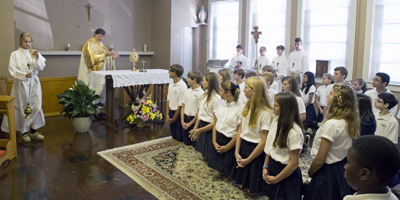
COLUMBIA—Catholic education is important enough to Natalie Hudson that she has worked two jobs so she and her husband could send their three boys to St. Joseph School in Anderson.
Now, her family is among thousands around the state hoping SAFE grants will be available to help them with tuition this school year.
Safe Access to Flexible Education (SAFE) Grants were announced July 20 by Gov. Henry McMaster and people immediately began applying. However, the grants were put on hold July 22 after a lawsuit was filed in Orangeburg County.
School officials and families are now waiting on a judge’s decision about the grant program that would help low-and middle-income families pay for tuition at participating independent schools. The program would make grants of up to $6,500 per student available to families for use toward tuition. Up to $32 million for the grants would come from the Governor’s Emergency Education Relief fund, allocated to the state because of the COVID-19 pandemic.
Shortly after the announcement of the grants, Orangeburg County Circuit Court Judge Edgar Dickson put a hold on the program after a lawsuit was filed by an Orangeburg County resident claiming that the SAFE grants violate the state constitution by using public funds for private or religious education. A hearing on the lawsuit was scheduled for July 29 at the Orangeburg County Courthouse.
Officials from the diocese said blocking the grants is a disservice to families in need who want Catholic education for their children.
“This temporary injunction hurts low- and middle-income parents who want to continue sending their children to the school of their choice,” the diocese said in a statement. “Every child deserves the opportunity to learn in the educational environment that best suits his or her needs, whether it is a public, private, or religious school.”
SAFE grants would be available to students from households with an adjusted gross income of 300 percent or less of the poverty level. For a family of four, that translates to an income of $78,000.
A total of 2,500 grants will be awarded on a first-come, first-serve basis, then distributed through a lottery after that to allocate the balance of available grant funds, as needed.
Many, many parents are hoping to earn one of those grants. The lawsuit did not halt the application process, and Gov. McMaster noted on social media that more than 8,200 families across the state had applied for the grants in the first three days after they were announced.
Mrs. Hudson said the funds would be a huge help for her family. She works full-time at Michael’s and her husband Jerrod is in the U.S. Army reserves. He was furloughed from his civilian job until recently because of COVID-19. She said she has taken on additional work in the past to help pay tuition for her sons, ages 4, 11 and 14.
“I think the misconception people have is that if your kid is in a private school, you’re rich, and that’s not always the case,” she said. “We keep our kids at St. Joseph because they get to learn about their faith as well as a good general education, and also because the school is like a big close-knit family. I would work three jobs if I had to to keep them there because I really feel like that’s where God has placed them.”
Principals at schools in the diocese said they hope the grants will be upheld because they would provide much-needed help to families.
“Most of our students are on tuition assistance and a lot of their parents have lost jobs or been furloughed because of COVID-19,” said Haymee Giuliani, principal at St. Joseph. “These grants would really help these families who already go to our school as well as others who have been applying because they want a Catholic school environment for their kids.”
Giuliani said their enrollment has increased recently, going from 56 students in K-4 through eighth grade last year to an anticipated 85 students for the 2020-21 school year.
The grants would also be invaluable for many families at Divine Redeemer in Hanahan, according to principal Paulette Walker. Her school serves 151 students in K-3 through eighth grade, and 98 percent of the student body receives some sort of financial aid.
“Within a five-mile radius of our school, the median family income is $40,000 a year,” Walker said. “Seventy-five percent of our enrollment is Hispanic students, and their families work in construction and housekeeping. Many of them have lost work because of the virus. These are parents who have sacrificed their health, their finances, everything, to send their kids to a faith-based school. I can’t even begin to describe how much impact these grants would have for us.”
Parents can learn more about the SAFE grant program and how to apply at https://mysceducation.org/school-subtype/safe-grants.



